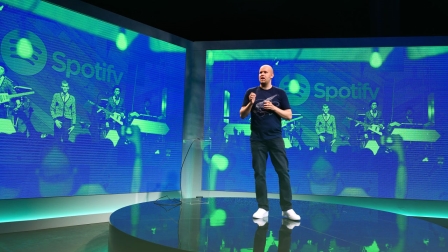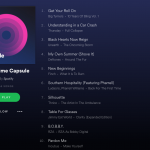Why Spotify Should Totally Buy SoundCloud
It’s rare to go a week in 2016 without some new development or rumor coming out of the streaming music industry. But seldom are these tidbits as interesting—or potentially consequential—as the news this week that Spotify is in “advanced talks” to acquire SoundCloud, according to the Financial Times.
The deal is by no means set in stone—Recode reports that it’s “more talk and less action” at this point—but it would certainly make a ton of sense. Not only would it shake up the constantly shifting streaming market by combining two major players, but a Spotify-SoundCloud merger would solve some very significant problems for both companies. It could even have trickle-down benefits for fans and—believe it or not—musicians.

Such a deal would marry Spotify’s industry-leading music subscription service (which has over 100 million total listeners, 40 million paying) with SoundCloud’s massive, more social and uniquely artist-friendly service (which has 175 million monthly listeners and over 125 million tracks). The result could be a sort of mega-platform for music and audio, one that offers an unparalleled (except perhaps by YouTube) source of free, ad-supported music fastened to the most robust music subscription service out there.
Not only would it make for a big competitive advantage, but the pairing just makes sense: The two services are already quite complementary in terms of content and would fit together nicely if they were more tightly integrated. The companies also share a similar cultural DNA: They’re both European startups founded by Swedish entrepreneurs, each with a smart, laser-fine focus on the intersection of music and innovation. Both have long been heavily involved in events like Music Hack Day, for instance. Although Spotify has grown much bigger than SoundCloud since both companies were founded about a decade ago, their roots remain remarkably analogous.
What Spotify Would Gain: Big Numbers, For Starters
If the rumors of an impending deal pan out, the timing could hardly be more ideal for Spotify: Apple Music, which racked up 17 million subscribers in its first 14 months, is quickly gaining steam, just as Spotify reportedly inches toward an IPO. Oh, and Pandora and Amazon are both expected to jump into the on-demand music space soon. Spotify may be the dominant music streaming service, but the threats are growing and, increasingly, coming from bigger, more deep-pocketed tech companies that can afford to run music services at a loss as they reap profits elsewhere. If there were ever a sensible time for Spotify to make a bold, preemptive strike, it would be now.
Some of the immediate gains for Spotify in this scenario are pretty obvious: Buying SoundCloud eliminates a competitor (albeit a tiny one in terms of the subscription business, which SoundCloud just entered in March), while giving Spotify a ton of new content and millions of new listeners. But while bigger numbers look good on an IPO filing, these numbers come with a few caveats. For one thing, Spotify and SoundCloud measure their audiences differently. SoundCloud’s 175 million monthly listeners is not a comparable metric to the registered users and paying subscribers that Spotify counts. That’s because to use Spotify, you have to sign up. But anyone can listen to SoundCloud tracks, which are embedded all over music blogs and the web at large. Plus there’s also already an unknown amount of crossover between SoundCloud and Spotify’s listeners, so it’s hard to gauge how much Spotify’s audience would actually grow with a SoundCloud acquisition.
Either way, though, Spotify would be gaining many millions of new listeners. And while those are predominantly the sort of non-paying listeners that so deeply frustrate the music industry, nabbing them gives Spotify two opportunities: First, it could bolster its free, ad-supported service with millions of additional listeners (using its advertising salesforce and infrastructure—which are vastly more mature than SoundCloud’s—to wring more revenue out of it). More important, Spotify would have a whole new army of listeners that it could try to lure to its premium subscription tier. Even a modest percentage of converts could give Spotify a sizable boost in paying subscribers at a time when it could really use it.
The Ultimate Music Streaming Mega-Platform
By buying SoundCloud, Spotify could create something that no rival could emulate: a monster catalog that covers an entire universe of music from undiscovered garage bands to the biggest stars in the world.
Right now, Spotify has roughly the same catalog that every other music subscription service offers (with a few famous exceptions like Prince and Neil Young, and putting aside the contentious issue of exclusive album debuts). Buying SoundCloud would mean buying something that nobody else has: SoundCloud’s massive library of music and other audio content. It’s a unique asset: SoundCloud’s collection of music and audio is an entirely organic behemoth that was built by its community of users over the course of several years. Not even Apple, with its mountains of cash, could easily replicate it.
Of course, that trove of user-uploaded sound includes a significant amount of—let’s be frank here—total garbage: bedroom demos, mediocre Justin Bieber covers, shoddy recordings of street musicians, you name it. There’s also the hairy issue of piracy and takedown notices that comes with running a site that allows people to upload content. Spotify gets its music from record labels and third-party distributors, so this would be new territory for the company.
But make no mistake about it: SoundCloud features a ton of music that people want to hear, much of which they can’t get anywhere else. This includes everything from up-and-coming indie dream pop bands and electronic musicians (for whom free, self-serve music distribution tools like SoundCloud and Bandcamp are priceless) to stars like Kanye West, Chance the Rapper, Skrillex, and many others who actually use the platform to upload new tracks—sometimes early or exclusively—and interact with fans in a way that other streaming services don’t quite allow.
Indeed, so much of the value of SoundCloud has less to do with track numbers and listener metrics and more to do with something less measurable: street cred. For an online music service, SoundCloud enjoys a rare sort of affinity among artists who tend to see it more as a hands-on distribution and promotion tool rather than a totally new model with unclear motives and consequences. Spotify, on the other hand, has spent years at the center of a debate about the economics of streaming and royalty payouts and what the industry’s shift toward streaming—now in full swing—means for music’s creators themselves.
Spotify has slowly gotten better at selling its virtues to artists, even as the basic economics of streaming remain questionable for smaller and middle-class musicians. The company has started aggressively building out its artist relations efforts, most recently by hiring former Lady Gaga manager Troy Carter, in the hopes of winning over the hearts and minds of more artists as streaming explodes. They’ve also added new features for artists like concert listings and the ability to sell merchandise within Spotify (through a third party partner site). The popularity of Spotify’s in-house playlists and Discover Weekly are starting to have a powerful trickle-down effect for some artists too. Still, the company has a lot of work to do in this department. Owning a musician-empowering platform like SoundCloud could make Spotify’s pitch to the artist community a bit more compelling, especially if swiftly puts its resources to use turning SoundCloud into an even more artist-friendly platform.
SoundCloud is also a huge source of podcasts, which is something Spotify has been trying to get into more and more. SoundCloud has been at the podcast-hosting game longer, so it’s a bit more established than Spotify’s comparatively new offerings. Merging their content and resources on the podcasting front could make for a more compelling podcast discovery and listening experience as the podcasting industry continues to come of age.

A Music Data Powerhouse To Rival Pandora—And Stun Apple
Whatever other effects the internet may have on music, one of the most important ones is the explosion of data. We now know more about listener behavior, how money flows, the complex connections among artists, genres, and individual songs, and so much more. It’s a huge deal and it’s going to be a major strategic asset as the music industry evolves. Between Spotify and SoundCloud, there’s an absolute shitload of data.
Spotify already knows an incredible amount about how we listen to music and the complex inner-workings of its already vast universe of songs and artists. Its 2014 acquisition of the Echo Nest—easily one of the smartest deals made in streaming music in years—helped supercharge Spotify’s data science capabilities exponentially. Recent data-powered curation features like Discover Weekly, Fresh Finds, Release Radar and Daily Mix merely scratch the surface of what Spotify’s monstrous data machine is capable of.
SoundCloud doesn’t have anything close to this data-crunching sophistication, but it does have something extremely valuable: billions of streams. In fact, some of Spotify’s music-tracking and data-driven curation projects are limited by a blind spot when it comes to smaller, up-and-coming artists that simply haven’t made their way to Spotify yet. Something like Fresh Finds, which uses some pretty sophisticated web-crawling and data sorcery to spot songs that are about to break—would be considerably more accurate and useful if Spotify could mine a source like SoundCloud, where so much of the brand new, about-to-blow-up stuff lands first.
And that’s just the beginning of what’s possible. Plugging SoundCloud’s mountainous audio catalog and listening activity data into its virtual brain would give Spotify a much more comprehensive view of online listening activity in general, much more so than any other single streaming service. The quest for this sort of birds-eye-view of online listening is exactly why Pandora acquired Next Big Sound last year (notably, SoundCloud pulled its data from Next Big Sound shortly after the acquisition). Pandora’s already massive trove of listening data—powered by 10 years of internet radio streaming from tens of millions of people—is poised to get even smarter if its upcoming on-demand Spotify competitor manages to take off and expose deeper insights into people’s music preferences.
Such a scenario would leave Apple Music with a bit of catching up to do in the data department. Although Apple has years of user intelligence from operating iTunes, Apple Music itself is still young and learning about its small but growing audience. Once its data becomes more robust, it’s anybody’s guess how Apple would put it to use. The service is notoriously shy about sharing data with partners, labels, and artists. And on the consumer side, Apple Music is eschewing algorithm-fueled functionality in favor of human-curated playlists and terrestrial-style radio.
What SoundCloud Gets (A Lifeline, Mostly)
SoundCloud may be a popular destination for new music—and even one that many artists love—but that doesn’t make it a business. For years, the company has struggled to come up with a viable business model. Prior attempts included the addition of advertising and paid “pro” accounts for creators, neither of which took off in any substantial way. Once SoundCloud settled on the idea of launching a paid, on-demand subscription service, the process was reportedly stalled by sluggish negotiations with the labels and some internal turmoil.
After finally buttoning up all the necessary licensing deals with labels and rights holders—including some unique arrangements that allowed SoundCloud to legitimize some of its “derivative” content like remixes, DJ sets, and cover songs—the company announced SoundCloud Go in March 2016. By then, the subscription market was well-dominated by a quickly growing Spotify, with players like Google, Apple, Deezer, and Tidal angling for subscribers as well. SoundCloud Go didn’t offer much to paying subscribers that they couldn’t get in more polished form elsewhere. Indeed, the service has seen a downward trend in new signups since April, according to data from marketing analytics firm Jumpshot. Earlier this month, SoundCloud announced a promotion offering three months of SoundCloud Go for 99 cents to try and jump start subscription growth.
An acquisition by Spotify would relieve this pressure to try and make yet another subscription service work and allow SoundCloud to focus its resources elsewhere, supercharged by the influx of additional resources that a parent company like Spotify could offer in just about every domain of the operation: design, product development, data science, artist relations and more.
Of course, a SoundCloud-Spotify hybrid wouldn’t solve the broader economic questions around streaming. It’s still a tricky business from which none of these companies are making a consistent profit, even as many artists keep crossing their fingers for a sustainable future. But eventually, the theory goes, the economic viability of streaming music will come as the model truly scales. We’ll see about that. In the meantime, companies like Spotify will need to do everything they can to innovate, reel in subscribers, and keep the growing competition at bay. Snatching up SoundCloud wouldn’t be a bad start.
Fast Company , Read Full Story
(77)











